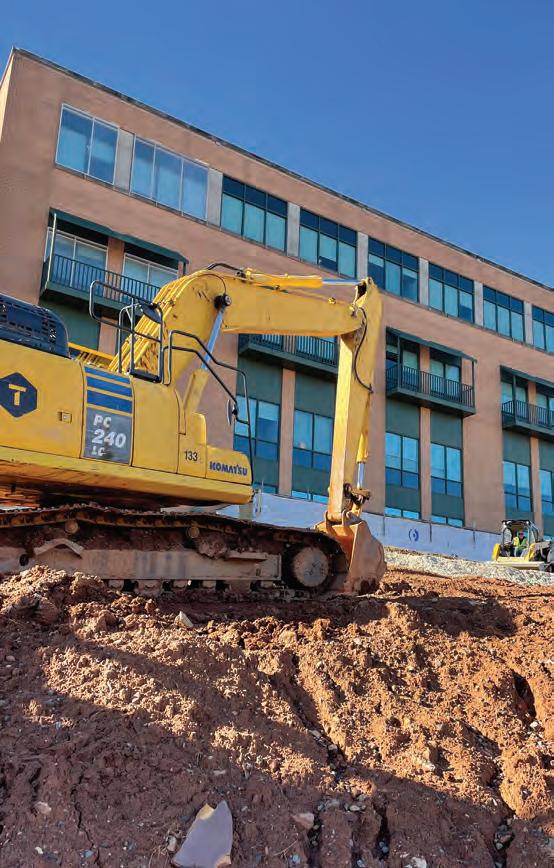
3 minute read
Health systems expand reach in Cobb as officials confront non-COVID crises
from Forecast 2023

By Jake Busch jbusch@mdjonline.com
As the impact of COVID-19 receded in 2022, Cobb health officials began turning their sights toward other health challenges facing the county.
In 2023, Cobb and Douglas Public Health, the county’s public health authority, will create a strategic plan to try and put the findings of the 2022 community health assessment, a sort of five-year checkup for the county, into action. One of the first steps is a matching grant program of up to $25,000 for partners tackling the challenges outlined in the report.
Dr. Janet Memark, CDPH’s director, called the health assessment a “snapshot into the health of our community” that gauges the major challenges facing the region, with mental health and addiction being two of the biggest.
The hope is that, with an easing of the pandemic’s strain on health systems, more attention can be turned to combating mental health crises and drug addiction in Cobb.
Among the most startling revelations from the health assessment is that suicide became the second leading cause of premature death (in numbers of years of life lost) in Cobb during the five-year period surveyed from 2016 to 2020, killing about 13 people per 100,000 residents each year.
Alongside a mental health crisis gripping Cobb and other communities is a drug addiction crisis, being exacerbated by the likes of synthetic opioids such as fentanyl, which is 50 to 100 times stronger than morphine.
“It was getting a little bit better, but now it seems like it’s getting worse again…This is a problem that has been brewing for a while, and it keeps changing its face a little bit,” said Memark. “We went from having a prescription drug problem, to … heroin, and it’s now these synthetic opioids that are very, very concerning.”
Data from the Georgia Department of Public Health indicated that there were 123 opioid overdose deaths in Cobb in 2021, with 97 due to synthetic opioids. Data has not yet been released for 2022.
In response to growing concern around opioid abuse, Cobb County implemented the Opioid Fatality Project, which, assisted by a federal grant, has brought together law enforcement, public health officials and politicians to combat both drug trafficking and drug use in the county.
Despite the health challenges facing Cobb in the coming year, there are also expanding healthcare opportunities for residents.
In the early fall of 2022, the U.S. Department of Veterans Affairs opened a new, 65,000-square-foot clinic in Marietta.
The new clinic is one of five multi-specialty clinics in the Atlanta VA system, and the only one north of Interstate 20 that’s not in Decatur.
In Cumberland, a new state-of-the-art medical office building from Northside Hospital opened at the start of January.
The 60,000-square-foot building at Atlanta Road and Cumberland Parkway houses numerous primary care providers and offers imaging, outpatient surgery and infusion services. Specialties based at the building include medical oncology, cardiology and urology.
Steve Aslinger, director of facilities planning for Northside, said the Cumberland area is a fast-growing market with more than 230,000 residents the health system can serve.
“Northside Hospital and its physicians already have patients who live and work in this area, so placing health care facilities and services here provides convenience for patients by reducing their commute and improving their access to care,” Aslinger said. “Cumberland is a perfect example of the health and access to care needs aligning with a growing community.”
Meanwhile, Cobb’s largest healthcare provider, Wellstar Health System, is reaching new heights — literally.
In the works for the system is a new tower at flagship facility Kennestone Hospital to expand the hospital’s number of beds. The seven-story tower will add 61 acute-care beds and relocate 67 other beds from around the hospital.
“We are thrilled to offer our community a future, stateof-the-art bed tower, and I am pleased to report significant progress with its enabling work to date,” said Callie Andrews, Kennestone and Windy Hill hospitals’ senior vice president and chief operating officer. “This tower is being designed with the utmost patient and provider comfort, safety and functionality in mind, and it will offer all-private rooms along with other personalized service offerings.”
The tower will offer private rooms focused on patient, family and healthcare provider comfort and include high-quality NICU and neonatal services, in addition to expansions in other crucial services and spaces.
“The tower also allows us to build on our reputation of excellence in key neuroscience, surgical and cardiovascular service areas and offers expansion of other critical, healthcare service areas which will benefit the future growth of healthcare needs for your entire family,” Andrews said.
Construction began late in the fall of 2022, and the tower has an expected completion date of late 2025, with patients beginning to occupy its beds beginning early 2026.







